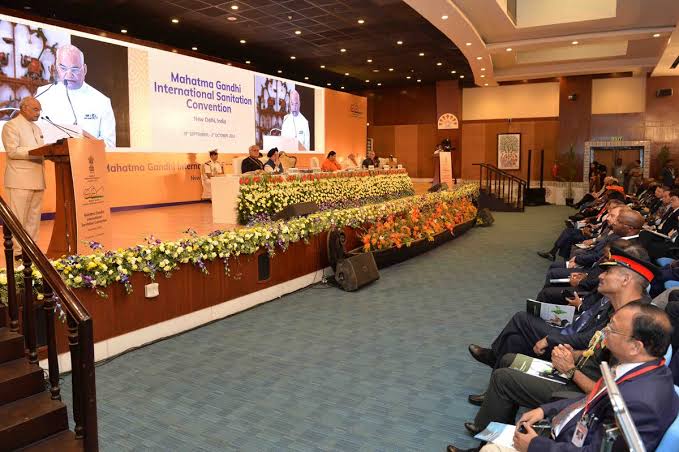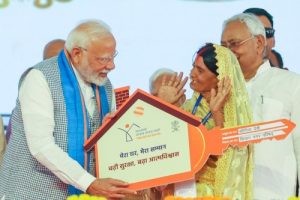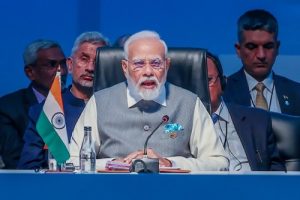I am happy to be here at the ceremony for the Gandhi Peace Prize. The Prize was instituted for individuals and organisations working in the service of humanity and in accordance with Gandhian principles of ahimsa and harmony. My congratulations to the four organisations and to the sole individual, Mr Yohei Sasakawa, who have been conferred the Prize. Their exceptional contributions to society are a tribute to the ideals of Mahatma Gandhi.
- The Gandhi Peace Prize was instituted to coincide with the 125th anniversary of the birth of the Mahatma. This year marks his 150th birth anniversary. And this milestone is a celebration not just for India but for all countries and all humanity. In the past 25 years, winners of the Gandhi Peace Prize have ranged from Nelson Mandela to Baba Amte, and from the Ramakrishna Mission to Bangladesh’s Grameen Bank. Each of them has been an exemplar of the Gandhian way – of ahimsa and compassion, of service and ethics.
- Mahatma Gandhi left a deep impact on India. He transformed our society and politics and, if I could put it so, our spirituality. In his persona, he represented a confluence of the humaneness and the humanitarian values of East and West. He was a global leader who brought together global best principles. Wherever I have travelled, in diverse countries and distant continents, I have experienced a deep reverence for Gandhiji. He remains the ultimate embodiment of India.
- Gandhiji believed that truth and non-violence – ahimsa, as he termed it – are two sides of the same coin. He considered truth the goal and ahimsa the means. Such a conceptualisation is consistent with Indian tradition and civilisation. India’s engagement with external cultures and nations has been built on the tripod of fraternity, cooperation and peace – on the idea of “Vasudhaiva Kutumbakam” or seeing the World as One Family.
- It is to Mahatma Gandhi’s eternal credit that he effected transformational changes by non-violent means and by seeing ahimsa not merely as the absence of violence but as a positive expression in itself. Vinoba Bhave, a close associate of Gandhiji, said it best when he remarked that in the Mahatma he detected both “kranti” and “shanti” – both revolution and calm.
- Gandhiji emphasised “sarvodaya”. In Hindi this word can be broken into its roots – “sabka” (all) and “udaya” (rise or uplift). Sarvodaya, as such, denotes the uplift and salvation of all, especially those most underprivileged and living at the base of the socio-economic pyramid. The Mahatma gave us a talisman to judge any policy and indeed any action – to assess if the proposed action would enhance the life, dignity and destiny of the poorest person we had met. This is a talisman for all times, all places and all conditions.
- Gandhian thinking, Gandhian modes of struggle and Gandhian ideals of achieving human liberty by conciliation, by appealing to the conscience of the opponent, have influenced some of the greatest of our age. From Martin Luther King Jr in the United States to Nelson Mandela in South Africa and Lech Walesa in Poland, a dazzling galaxy of statespersons has learnt and borrowed from Gandhiji. Gandhiji and his thoughts are invaluable to any understanding of contemporary human history, and of the quest to redress oppression and inequity.
- Mahatma Gandhi remains relevant to 21st century concerns as well. In his advocacy of sustainability, ecological sensitivity and living in harmony with nature, he anticipated some of the pressing challenges of our times. The Sustainable Development Goals adopted by the United Nations are Gandhian philosophy in action. India’s pivotal role in the International Solar Alliance and its domestic Swachh Bharat Mission – aimed at the universalisation of modern sanitation – too are reflective of Gandhiji. It is almost natural to invoke the Mahatma in any discussion on climate change mitigation – and in any determined move to eliminate poverty. As he famously said, “The earth has enough for everyone’s need but not for everyone’s greed.”
- Ladies and Gentlemen, The Gandhi Peace Prize was instituted to acknowledge achievers who took forward Gandhian principles that I have just described. Our world is fortunate that there are several virtuous institutions and individuals who adhere to the Mahatma’s mechanism. I can imagine how difficult it would have been for the Gandhi Peace Prize jury, chaired by the Prime Minister, to make its final selection. I congratulate the jury for naming such an illustrious array of award winners. The citations and acceptance speeches we have heard today are revealing. I am confident that the stellar examples of our Prize winners will in turn inspire others.
- The Vivekananda Centre was established by Eknath Ranade, a remarkable man who lived a life dedicated to the poorest and most deprived. The Centre has promoted self- help, sustainability and development throughout our country, especially in areas populated by tribal communities. It has built capacities in education and health, and in a sensitive and meaningful approach to rural development and harnessing of natural resources.
- The Akshaya Patra Foundation has advanced education and cognition by working to remove hunger and enhance nutrition. It has leveraged modern technology to provide quality meals to schoolchildren. Despite the scale at which it operates, it has been extremely mindful of food hygiene and safety. I am told that the Foundation provides nutritious meals each day to 1.8 million children, spread across 12 states of India. This is a staggering achievement.
- October 2 this year will mark the 150th birthday of Mahatma Gandhi. India is committed to attaining the benchmarks of Swachh Bharat by that day – in terms of provision of toilets and modern sanitation facilities; ending of open defecation; and an overall embracing of optimum hygiene practices. This striving has become a mass movement. Together people and government have channelled energies – systemically, institutionally and individually. This has had an effect on health and safety indices, on gender justice, on prevention of diseases that are caused by open defecation – and on the larger construct of human dignity.
- Sulabh International, founded by Dr Bindeshwar Pathak, has made crucial contributions to this effort. Dr Pathak and his organisation were sanitation pioneers, advocating its merits and advocating toilets in days and years when not many others were. The Gandhi Peace Prize is recognition of that singleminded pursuit of a better, more just world.
- Mahatma Gandhi spoke of the Indian soul residing in our countless villages. Even today, a majority of our people live in rural habitats. India’s development is simply incomplete without rural India’s development. The Ekal Abhiyan Trust abides by this belief. It takes it forward by helping 2.2 million children – 52 per cent of them girls – access education. Many of its initiatives benefit tribal communities; all of its initiatives are a tribute to the Mahatma and his vision.
- The sole individual to be named for the Prize today is Mr Yohei Sasakawa. He has been instrumental in helping us win crucial battles in the war against leprosy – to prevent and eradicate the disease, and to end stigma and discrimination. Mr Sasakawa is a shining sample of the best characteristics of our Japanese friends. As Rabindranath Tagore said in Tokyo in 1924, “I have a deep admiration for you people … In your character you have combined the brilliance of fire and the fluidity of water.” On behalf of India, I must appreciate the services of Mr Sasakawa and his Foundation.
- With those words, I once more congratulate the Prize winners – not just for receiving the Gandhi Peace Prize but much more than that for following in the footsteps of Mahatma Gandhi. I hope and believe your noble deeds will show the light to others.
Thank you, Jai Hind!
























